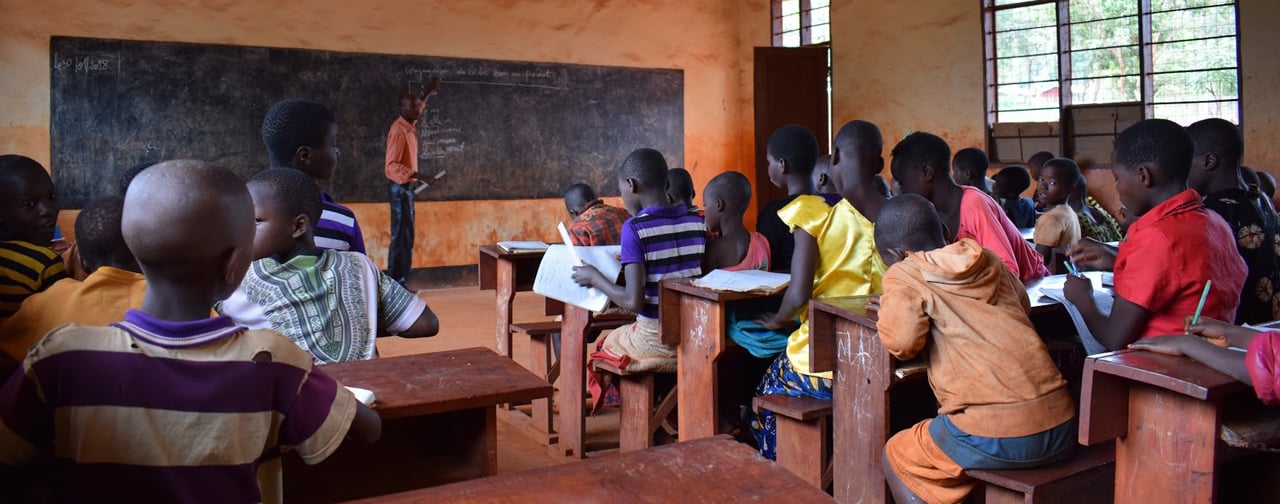PVACS is a mixed-methods cluster randomised controlled trial of a school-based intervention that uses cognitive behavioural therapy principles to change teachers’ attitudes, beliefs, and behaviours towards corporal punishment. The study also includes qualitative research, a process evaluation and economic evaluation.
The study is a collaboration between LSHTM, the International Rescue Committee (IRC), Innovations for Poverty Action (IPA), the National Institute for Medical Research (NIMR), and the Behavioural Insights Team (BIT).
PVACS is a cluster randomised trial evaluating the EmpaTeach intervention to reduce and prevent corporal punishment in primary and secondary schools in Nyarugusu Refugee Camp in Kigoma region, Tanzania. PVACS also includes a mixed-methods process evaluation and an economic evaluation.
EmpaTeach leverages principles from cognitive behavioural therapy to promote shifts in teachers’ beliefs, attitudes and behaviours related to corporal punishment. The intervention consists of a 10-week peer-led set of sessions during which teachers learn emotional self-regulation strategies and alternatives to corporal punishment, including positive discipline and classroom management techniques.
PVACS builds on years of piloting and adaptations and it will provide some of the first evidence on the effectiveness of a school-based intervention aimed at reducing physical and emotional violence against children in schools in a refugee setting. The study will inform programming and service-delivery in Tanzania and other crisis settings.
This project is part of the Child Protection Research Group.
PVACS is led by LSHTM in collaboration with the International Rescue Committee (IRC), Innovations for Poverty Action (IPA) and National Institute of Medical Research in Tanzania (NIMR), and the Behavioural Insights Team (BIT).
LSHTM leads the overall PVACS evaluation and oversees all research activities.
IRC and BIT developed the EmpaTeach programme and IRC is implementing the intervention.
IPA is the data collection and research implementation partner in Tanzania.
NIMR is the local research lead on the qualitative aspects of the evaluation.
- Principal Investigator (LSHTM): Dr Karen Devries
- Study manager (LSHTM): Camilla Fabbri
- Statistician (LSHTM): Elizabeth Allen
- Co-Investigators (NIMR): Elizabeth Shayo, Vivien Barongo
- Implementation lead (IRC): Katherine Rodrigues
- Research Coordinator (IPA): Mary Qiu
PVACS study publications
Fabbri, C., Powell-Jackson, T., Leurent, B. et al. School violence, depression symptoms, and school climate: a cross-sectional study of Congolese and Burundian refugee children. Confl Health 16, 42 (2022).
Fabbri, C., Rodrigues, K., Leurent, L. et al. The EmpaTeach intervention for reducing physical violence from teachers to students in Nyarugusu Refugee Camp: A cluster-randomised controlled trial. PLOS Medicine 18(10): e1003808. (2021)
Devries, K.M., Fabbri, C., Allen, E. et al. Preventing violence against children in schools (PVACS): protocol for a cluster randomised controlled trial of the EmpaTeach behavioural intervention in Nyarugusu refugee camp. BMC Public Health 19, 1295 (2019)
Pilot Resources
The EmpaTeach intervention was developed by IRC in collaboration with BIT over a two-year period, drawing on mixed-methods formative research, behavioural theory, and a rapid-cycle experiment with teachers to determine the effectiveness of different intervention messages. A small pilot was conducted in two schools in Mtendeli refugee camp (also in the Kigoma region) to assess the acceptability and feasibility of the intervention, and to generate insights to improve the intervention design.



